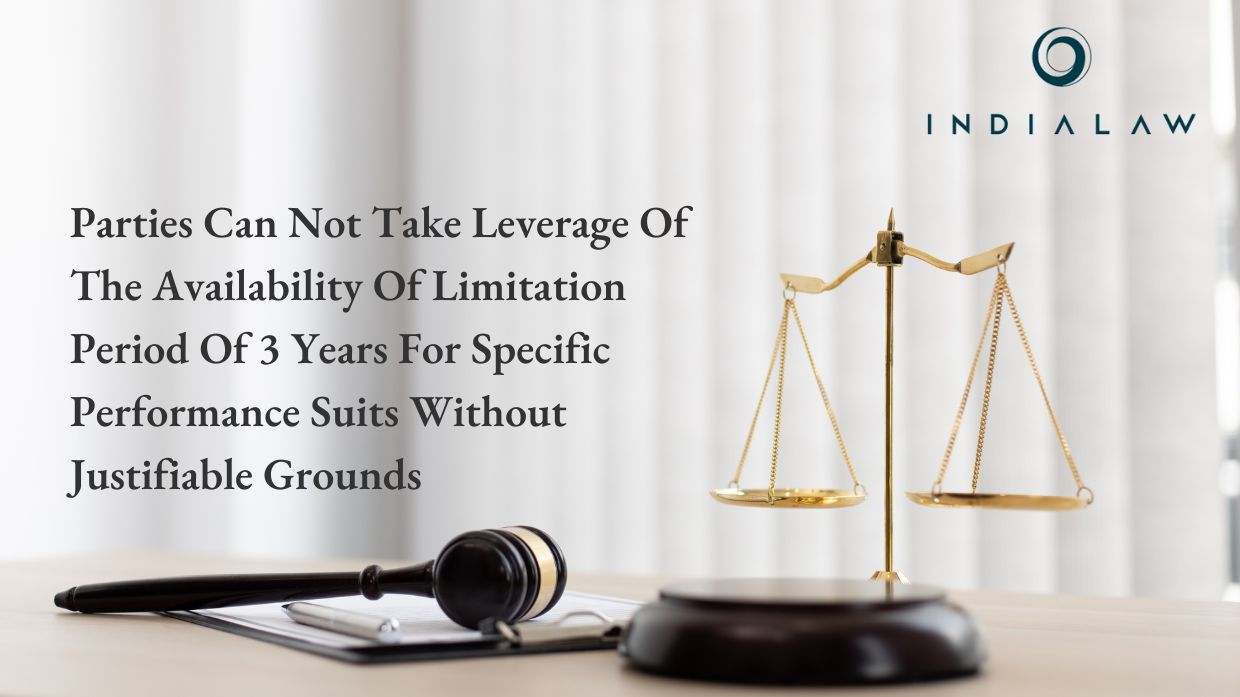Parties Can Not Take Leverage Of The Availability Of Limitation Period Of 3 Years For Specific Performance Suits Without Justifiable Grounds

The Hon’ble Supreme Court (“SC”) in a recent decision[1], reiterated the position settled by courts, regarding when a specific performance suit ought to be preferred by a party to an agreement.
The facts in the present case were that the plaintiff entered into an Agreement to Sell for the sale of a parcel of land (“said Agreement”) with the power of attorney holder of the defendants for a certain consideration. Per the terms of the said Agreement, the plaintiff paid Rs. 41,000/- on the date it was executed, and it was agreed that the remaining amount will be paid on the date of registration of the said Agreement, which had to be done mandatorily within six months from the date of the said Agreement.
Thereafter, on 22nd May, 1996, the plaintiff paid Rs. 20,000/- an endorsement was made on the said Agreement acknowledging this payment and on 30th June, 1996, an amount of Rs 40,000/- was paid. There were subsequent agreements executed, recording extension of the said Agreement, and the date of execution was agreed as 31st May, 1997.
The power of attorney holder of the defendants, thereafter, executed a sale deed for the suit land on 14th May, 1997, in favour of himself and two other defendants. The plaintiff was subsequently, informed by the sub-registrar that the suit land was already sold in favour of the defendant nos. 12 to 14. The plaintiff objected to the application for mutation of names on 20th August, 1997, on the ground that he still had possession of the suit land and filed a suit seeking specific performance of the said Agreement on 19th June, 2000.
The first issue raised in the present case was that the plaintiff filed the suit on the last day of the limitation period. The SC, in this case, decided the same against the plaintiff and held that he is not entitled to specific performance, since the plaintiff, even though he was aware that the sale deed dated 14.05.1997 executed in favour of defendant nos. 12 to 14, sent a legal notice on 30th May, 1997 and even objected to the application for mutation of names on 20th August, 1997 and did not file a suit till 19th June, 2000.
The SC relied on three prior decisions[2] to state that, even in the absence of time being the essence of a contract, in a suit seeking specific performance of an agreement, the timelines mentioned in the agreement cannot be disregarded and a lethargic attitude ought not to be permitted.
The second issue dealt with by the SC was with respect to the deposition made by the power of attorney holder. The SC referred to divergent stances taken by various High Courts; one such case was Shambhu Dutt Shastri v. State of Rajasthan[3] wherein, it was held by the Hon’ble Rajasthan High Court that there cannot be any delegation of power to depose as a witness given to a general power of attorney holder. Hence, the power of attorney holder was not permitted to depose in the present case. In conclusion, the present case reinforces the settled position of law, by reiterating that specific performance should be sought within a reasonable time even though the same may not be barred by limitation. In the authors’ opinion, the judgment would act as a catalyst to expedite the legal recourse and discourage others from waiting almost until the stipulated limitation period is to expire to seek specific performance of agreements.
[1] 2024 SCC OnLine SC 981.
[2] K.S. Vidyanadam v. Vairavan, (1997) 3 SCC 1; Azhar Sultana v. B. Rajamani, (2009) 17 SCC 27; and, Saradamani Kandappan v. S. Rajalakshmi, (2011) 12 SCC 18.
[3] [(1986)] 2 WLN 713 (Raj)].
By entering the email address you agree to our Privacy Policy.



